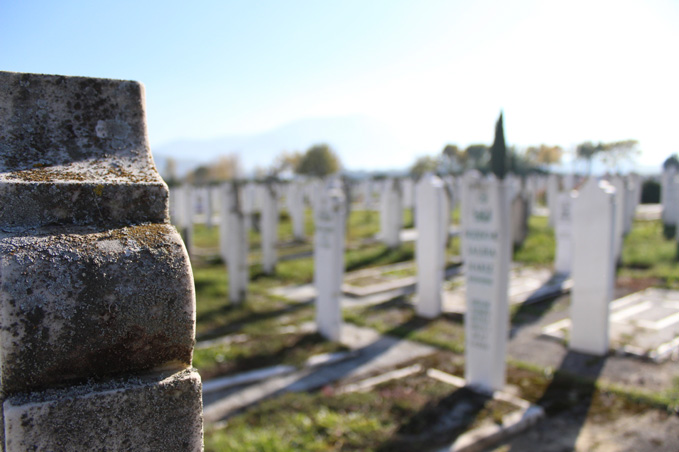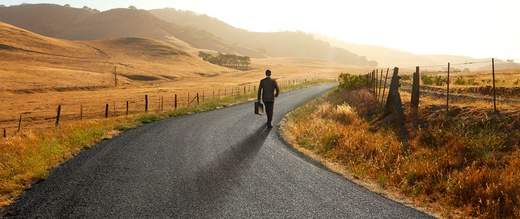The views expressed in our content reflect individual perspectives and do not represent the authoritative views of the Baha'i Faith.
Although a man may progress in science and philosophy, if he does not take advantage of the power of the spirit, he is incomplete. – Abdu’l-Baha, Divine Philosophy, p. 88.
I love walking through cemeteries. It might seem strange, but cemeteries give me hope.
In the town my wife and I live in, several old cemeteries dot the landscape. Walking through them always inspires both of us with a strong sense of the progress of humanity.
 Right now you’re probably silently asking yourself “What could a cemetery possibly have to do with human progress?”
Right now you’re probably silently asking yourself “What could a cemetery possibly have to do with human progress?”
I know it sounds a little incongruous, but let me explain.
The small town we live in has a long history, dating back to the middle of the 1800s, when settlers discovered gold nearby. The American gold rush began in 1848, as word of those early discoveries at places like Sutter’s Mill in Northern California reached the more populated eastern cities, and hordes of people descended on the area. Small towns rapidly grew into cities overnight. The entire landscape changed as a result of the influx of so many wealth seekers. They sailed around the tip of South America, rode across the continent on horseback, took covered wagons overland and got here any way they could, all to get rich quick.
In the process they pushed out and eventually almost exterminated the native peoples, created a huge migration westward and made a few lucky prospectors very wealthy. Many more, though, died trying. They perished when terrible blizzards hit; when other miners jumped their claims and killed them; when mines collapsed on them; when diseases proliferated in crowded, unsanitary conditions; when silicosis from breathing rock dust attacked their lungs; when they ran out of money and starved to death. The Gold Rush materially rewarded a few but made life miserable, brutish and short for many.
That means our little town, set in the beautiful Sierra Nevada foothills, probably now has more graves than living people.
When you walk through those graveyards, you read the old markers and headstones, and you can immediately infer several things about life in the last two centuries. First, many more men, women and children died early back then, and at much younger ages. Second, people generally lived much shorter and harder lives than they do today. Third, infant mortality struck in just about every family. Fourth, people tended to have many more children, probably because so few of them made it past childhood. Fifth, anyone who worked at hard labor in the mines shortened their lives considerably. Sixth, diseases ran rampant, with no cures in sight. Finally, a racist, violent, lawless and uncivilized society meant that Indians, African Americans, Hispanics and Asians had much shorter life expectancies.
You can read all of these terrible, tragic stories in the grave markers.
Once you’ve read them, you might conclude that we’ve made some progress as a society since then.
Not everyone would agree, though. Several accomplished historians and philosophers don’t believe in progress: Karl Popper and Kirkpatrick Sale, for example, call the entire idea of progress a lie. Instead, they say, progress is a cultural construct, the manufactured rival of natural ecology. Our material progress, Sale says in his famous essay Five Facets of a Myth (http://www.primitivism.com/facets-myth.htm), “threatens the very continuance of the human species…”
In this short series of essays, then, let’s take a look at the concept of progress, try to determine whether we’ve truly made any progress over time as a human species, and see if we can understand the idea of progress from a spiritual perspective, with the aid and assistance of the Baha’i teachings.
Baha’is have a nuanced, differentiated view of progress, seeing it as two separate and sometimes completely opposite kinds of inner and outer development:
Progress is of two kinds, material and spiritual. The former is attained through observation of the surrounding existence and constitutes the foundation of civilization. Spiritual progress is through the breaths of the Holy Spirit and is the awakening of the conscious soul of man to perceive the reality of divinity. Material progress insures the happiness of the human world. Spiritual progress insures the happiness and eternal continuance of the soul. – Abdu’l-Baha, Foundations of World Unity, p. 85.
Abdu’l-Baha goes on to say that sometimes, material progress does not equate with happiness, but instead can equal barbarism:
…when thou lookest at the orderly pattern of kingdoms, cities and villages, with the attractiveness of their adornments, the freshness of their natural resources, the refinement of their appliances, the ease of their means of travel, the extent of knowledge available about the world of nature, the great inventions, the colossal enterprises, the noble discoveries and scientific researches, thou wouldst conclude that civilization conduceth to the happiness and the progress of the human world. Yet shouldst thou turn thine eye to the discovery of destructive and infernal machines, to the development of forces of demolition and the invention of fiery implements, which uproot the tree of life, it would become evident and manifest unto thee that civilization is conjoined with barbarism. Progress and barbarism go hand in hand, unless material civilization be confirmed by Divine Guidance, by the revelations of the All-Merciful and by godly virtues, and be reinforced by spiritual conduct, by the ideals of the Kingdom and by the outpourings of the Realm of Might. – Selections from the Writings of Abdu’l-Baha, p. 283.
After all, material progress has eradicated some of the most terrible scourges of humanity, wiped out diseases and pandemics that once created massive pain and mortality, invented technologies that made life much more bearable and sustainable, and increasingly allowed more and more people to live freely in civilizations that guarded us from savagery and suffering. In that way, things have improved.
But that same material progress, we all know by now, has also created a conflictive, industrialized modern culture that threatens to overwhelm the Earth’s ability to support it. Our terrible weapons, our battling nations, the pollution of our entire planet, the iron-fisted rule of tyrannical and despotic governments—those and many other factors indicate that “progress and barbarism go hand in hand,” as the Baha’i writings clearly say. In these essays, let’s envision how we can separate the two things.

















Comments
Sign in or create an account
Continue with Facebookor